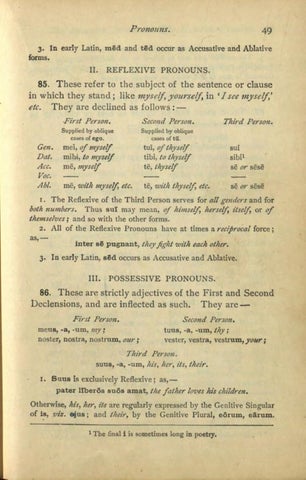Pronouns.
49
3. In early Latin, med and ted occur as Accusative and Ablative forms. II.
REFLEXIVE
PRONOUNS.
85. These refer to the. subject of the sentence or clause in which they stand; like myself, yourself, in 'I see myself,' etc. They are declined as follows:First
Gen. Dat. Ace. Voc. Abl.
Person.
Second Person,
Third Person.
Supplied by oblique cases of ego.
Supplied by oblique cases of tii.
mei, of myself mihi, to myself me, myself
tui, of thyself tibi, to tlzyself te, thyself
sui sibi! se or sese
me, with myself, etc.
te, with thyself, etc.
se or sese
I. The Reflexive of the Third Person serves for all genders and for both numbers. Thus suI may mean, of himself, herself, itself, or of themselves; and so with the other forms. 2. All of the Reflexive Pronouns have at times a reciprocal force;
as,-
inter se pugnant,
they fight with each other.
3. In early Latin, sed occurs as Accusative and Ablative. III.
POSSESSIVE
PRONOUNS.
86. These are strictly adjectives of the First and Second Declensions, and are inflected as such. They areFirst Person; meus, -a, -urn, my; noster, nostra, nostrum, our;
Second Pet"S01Z. tuus, -a. -um, tllY; vester, vestra, vestrum, your;
Third Person, suus, -a, -urn, his, her, its, their. I.
Suus is exclusively Reflexive; as,pater liberos
suos amat, the father
loves his children,
Otherwise, his, her, ita are regularly expressed by the Genitive Singular of i~, viz. &jus; and their, by the Genitive Plural, eorum, earum. 1 The
final i is sometimes long in poetry.
